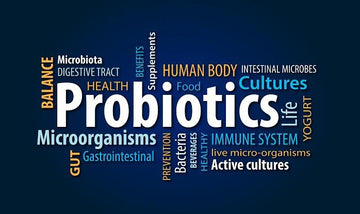Should you jump on the bandwagon of “gluten free” diet?
It’s hard to avoid aisles of “gluten free” food and snacks in the stores nowadays, making you wonder whether your morning slices of bread or pasta dinner have been doing more harm than good, especially if you experience some level of digestive troubles, such as bloating, gas, stomach cramps, diarrhea, or constipation.
So we've all heard about, but, what is a "gluten-free" diet as healthy as we think? In the never-ending debates on which diet works and which doesn’t, the vast majority of consumers just try to eat healthier and ward off digestive issues without feeling confused and lost. Let’s first talk about what gluten is, how it affects your gut health, and why gluten free probiotics can play such an important role in restoring digestive balance and nutritional nourishment.
What is gluten, and what really happens in your gut when you eat it?
Gluten is actually a type of protein, not starch, and is naturally found in wheat. It is also found in barley, malt, rye, bread mixes, meat substitutes, pasta, and commercial oats.
Gluten is elastic and has no taste, so food manufacturers use it as an additive. Gluten in flour makes fresh pasta and dough hold itself together because its cross-linked structure makes it very stretchable. This property also makes it harder to break down than starch in the body.
People’s ability to digest gluten varies when consuming high-carb products such as white bread, donuts, bagels, pizzas, biscuits, and pasta. Some seem totally fine, whereas others experience indigestive symptoms that can be described as a bit of “gluten sensitive.”
 What happens when gluten is consumed into your digestive system is that your body’s immune system could trigger an inflammatory response to gluten particles as if they were foreign substances or pathogens. A component of gluten in the wheat, called gliadin, is found by many scientific studies to be linked to causing inflammation in the intestines, but a small percentage of people are truly “gluten intolerant” with full blown allergic reactions as severe as any illness, called celiac disease. Celiac disease seriously affects people’s quality of life with severe symptoms such as diarrhea, abdominal pain, indigestion, constipation, malabsorption and malnutrition.
What happens when gluten is consumed into your digestive system is that your body’s immune system could trigger an inflammatory response to gluten particles as if they were foreign substances or pathogens. A component of gluten in the wheat, called gliadin, is found by many scientific studies to be linked to causing inflammation in the intestines, but a small percentage of people are truly “gluten intolerant” with full blown allergic reactions as severe as any illness, called celiac disease. Celiac disease seriously affects people’s quality of life with severe symptoms such as diarrhea, abdominal pain, indigestion, constipation, malabsorption and malnutrition.
- According to a lab experiment published in the journal Gut, gliadin may trigger an inflammatory response in both healthy people and those with celiac disease.[i]
- A study published in the Nutrients also showed that daily consumption of wheat may trigger inflammation and leaky gut, and may cause the immune system not to work properly.[ii]
- A study published in the journal Immunology showed that consumed gluten caused the release of inflammation-causing substances in the intestines.[iii]
The immune components in the intestines are the first to react when gluten is there in the first place. Inflamed intestines wouldn’t be able to digest food properly, so it tends to cause turbulent symptoms of stomach cramps, bloating, diarrhea, or constipation. Inflammation causes intestines to swell, making it unable to absorb nutrients from food, causing malabsorption and malnutrition.
What is leaky gut syndrome and how does it occur?

If you experience digestive issues often, you may want to try to eliminate certain food types starting with gluten, and determine whether gluten might be the source of the digestive discomfort.
Do probiotics help with gluten intolerance and leaky gut?
If you are prone to gluten sensitivity and leaky gut syndrome, your intestine’s proper functioning may have been compromised, so you will need all the help you can get to restore your digestive balance. For gluten sensitive consumers looking to maintain a pleasant eating and drinking experience, one simple way is to restore your gut’s microbial balance.
Probiotics are good bacteria naturally found in the intestines. They play some very important roles in the body, such as counter-balancing the bad bacteria, producing certain vitamins, aiding nutrient absorption, and stimulating the immune system.
There is evidence showing that probiotics may be beneficial for people with gluten sensitivity and leaky gut. Probiotics may help reduce the damage caused by gliadin from food. Adequate numbers of good bacteria may help reduce the body’s inflammatory response to gliadin.[iv] Also, there are several studies showing that probiotics may help protect cells of the intestines against damage caused by gliadin. [v][vi][vii]

Good bacteria may also prove helpful for relieving leaky gut, and it may work using several methods. A study published in The Journal of Pediatrics showed that probiotics might work by strengthening the integrity of the intestines, and down-regulate inflammatory symptoms.[viii]
Also, probiotics may work by counteracting inflammatory processes that contribute to the development of intestinal permeability.[ix] This study showed how probiotics, after strengthening damaged intestinal barriers, also protect them against disruption caused by injuries and inflammation.[x]
Based on these findings, it seems that probiotics may act as a salve to heal inflamed intestines, as well as a ‘stop leak’ remedy to relieve leaky gut. Choosing gluten free probiotics may help intestinal problems from worsening, making it ideal for someone with gluten sensitivity and celiac disease.
Choose Gluten Free Probiotics
You may find relief in your intestinal imbalance, such as gluten sensitivity and leaky gut, by taking gluten free probiotics. We addressed this matter by formulating sho Balance and making it gluten free, dairy-free, and vegan, suitable for people sensitive to not only gluten, but also lactose and other common allergens.
sho Balance uses the potent Lactobacillus casei K-1 as its probiotic strain. This particular type of probiotics has been extensively researched by Japanese scientists and known to have strong anti-inflammatory and detoxification properties. It is clinically proven to relieve constipation and regulate bowel movement[xi], which is largely correlated with anti-inflammatory relief of the gut.
sho Balance contains a clinically effective dose of 100 billion CFU of Lactobacillus casei K-1 in two small, easy-to-swallow vegan Spheri-Gels. Consuming sho Balance daily for a minimum of two weeks can help experience the optimal constipation relief and may work particularly well after consuming unhealthy foods such as over-processed, burnt meat.[xii][xiii]
sho Balance is different from other brands because it is a premium blend of natural ingredients that complement each other to maximize gut balance and anti-inflammatory effects.
Aside from probiotics, it comes with a dose of fructooligosaccharides (FOS) as a prebiotic. The FOS serves as food for the probiotics as well as control over inflammation in the intestines.
sho Balance contains spirulina, flaxseed oil and olive oil. These ingredients are renowned for their ability to lower inflammation and provide lubricating effects for bowel movement.[xiv][xv][xvi] They are gut-friendly, gentle, and beneficial to your gut.
Aside from containing natural anti-inflammatory ingredients, sho Balance’s patented, daily tracking dispenser makes remembering to take your supplements every day super easy and fun, so that you can truly experience the differences in your gut and your overall wellbeing when remembering to take your supplements every day.
Having gluten sensitivity, celiac disease, or leaky gut is not fun. Aside from the daily bouts of stomach cramps and irregular bowel movements ranging from diarrhea to constipation, you are at risk of malnutrition and compromised immune system, because inflamed intestines are not absorbing nutrients properly from the food you eat.
Taking gluten free probiotics can be a simple and effective way to alleviate inflammation in your gut flora environment, and sho Balance is an all-natural, safe, and effective probiotic supplement that can help you restore balance not only in your gut, but also in your overall immune system for optimal physical and emotional performances.
Resources:
[i] Is gliadin really safe for non‐coeliac individuals? Production of interleukin 15 in biopsy culture from non‐coeliac individuals challenged with gliadin peptides. Gut. 2007 Jun; 56(6): 889–890. doi: 10.1136/gut.2006.118265 https://www.ncbi.nlm.nih.gov/pmc/articles/PMC1954879/
[ii] The Dietary Intake of Wheat and other Cereal Grains and Their Role in Inflammation Nutrients. 2013 Mar; 5(3): 771–787. Published online 2013 Mar 12. doi: 10.3390/nu5030771 https://www.ncbi.nlm.nih.gov/pmc/articles/PMC3705319/
[iii] Dietary gluten alters the balance of pro-inflammatory and anti-inflammatory cytokines in T cells of BALB/c mice. Immunology. 2013 Jan;138(1):23-33. doi: 10.1111/imm.12007. https://www.ncbi.nlm.nih.gov/pubmed/22913724
[iv] Probiotics Prevent Gluten Sensitivity and Intestinal Damage from Gliadin. Heal Naturally. http://www.realnatural.org/probiotics-prevent-gluten-sensitivity-and-intestinal-damage-from-gliadin/
[v] Intestinal microbiota and probiotics in celiac disease. Clin Microbiol Rev. 2014 Jul;27(3):482-9. doi: 10.1128/CMR.00106-13. https://www.ncbi.nlm.nih.gov/pubmed/24982318
[vi] Live probiotic Bifidobacterium lactis bacteria inhibit the toxic effects induced by wheat gliadin in epithelial cell culture Clin Exp Immunol. 2008 Jun; 152(3): 552–558.
doi: 10.1111/j.1365-2249.2008.03635.x https://www.ncbi.nlm.nih.gov/pmc/articles/PMC2453197/
[vii] Intestinal Microbiota and Probiotics in Celiac Disease doi: 10.1128/CMR.00106-13
Clin. Microbiol. Rev. July 2014 vol. 27 no. 3 482-489 1 July 2014 http://cmr.asm.org/content/27/3/482.full
[viii] Effect of probiotics on gastrointestinal symptoms and small intestinal permeability in children with atopic dermatitis. J Pediatr. 2004 Nov;145(5):612-6. https://www.ncbi.nlm.nih.gov/pubmed/15520759
[ix] Effect of lactobacilli on paracellular permeability in the gut. Nutrients. 2011 Jan;3(1):104-17. doi: 10.3390/nu3010104. Epub 2011 Jan 12. https://www.ncbi.nlm.nih.gov/pubmed/22254077
[x] Protection and Restitution of Gut Barrier by Probiotics: Nutritional and Clinical Implications Curr Nutr Food Sci. Author manuscript; available in PMC 2013 Dec 16. Curr Nutr Food Sci. Author manuscript; available in PMC 2013 Dec 16.
[xi] Effect of administration of fermented milk using plant origin lactic acid bacteria on defecation Kimiko SENO, Takehisa KUMAGAI, Toshiyuki WATANABE, Sanae OKADA. Kameda Seika Co. LTD. NRIC Culture Collection Center, Tokyo University of Agriculture Center. https://www.jstage.jst.go.jp/article/nskkk1995/47/7/47_7_555/_article/-char/ja/
[xii] A strain of Lactobacillus casei inhibits the effector phase of immune inflammation. J Immunol. 2011 Sep 1;187(5):2646-55. doi: 10.4049/jimmunol.1002415. Epub 2011 Aug 1. https://www.ncbi.nlm.nih.gov/pubmed/21810608
[xiii] Lactobacillus casei CRL 431 administration decreases inflammatory cytokines in a diet-induced obese mouse model. Nutrition. 2015 Jul-Aug;31(7-8):1000-7. doi: 10.1016/j.nut.2015.02.006. Epub 2015 Feb 24. https://www.ncbi.nlm.nih.gov/pubmed/26059375
[xiv] Hypolipidemic, Antioxidant and Antiinflammatory Activities of Microalgae Spirulina. Cardiovasc Ther. 2010 Aug; 28(4): e33–e45. doi: 10.1111/j.1755-5922.2010.00200.x https://www.ncbi.nlm.nih.gov/pmc/articles/PMC2907180/
[xv] Flaxseed oil. University of Maryland Medical Center. http://umm.edu/health/medical/altmed/supplement/flaxseed-oil
[xvi] Molecular mechanisms of inflammation. Anti-inflammatory benefits of virgin olive oil and the phenolic compound oleocanthal. Curr Pharm Des. 2011;17(8):754-68. https://www.ncbi.nlm.nih.gov/pubmed/21443487










